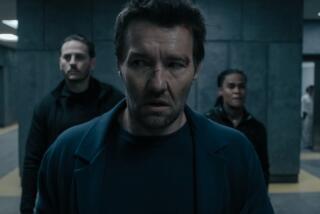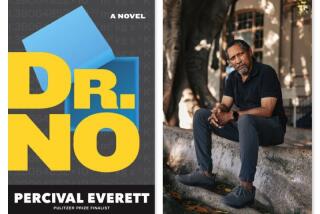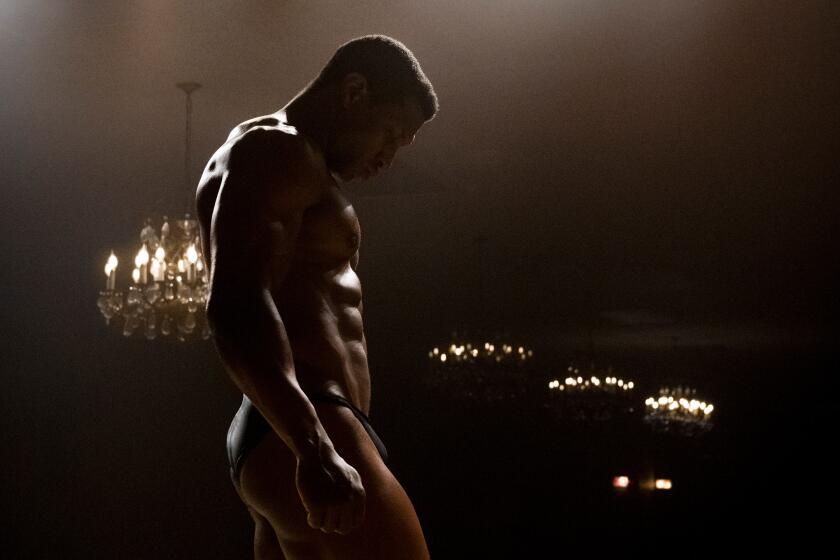Trying to unravel the mystery of a distant dad
- Share via
“Parallel Worlds, Parallel Lives” is not your usual edition of “Nova,” the PBS science anthology. The film, which airs tonight, follows rock musician Mark Oliver Everett -- better known as E, leader of Eels -- on a journey to discover the physicist father he never really knew and to understand something of his “Many Worlds Interpretation” of quantum mechanics -- at first, painfully ignored, but now taken quite seriously.
It might be called a biographical mystery. Filmed with animated sequences and visual conceits more familiar from rockumentaries and music videos, the story itself is like an episode of “This American Life.” (In fact, it’s been imported from the BBC.)
There is not all that much science in it, or just enough science to give you a sense of what strange and heady stuff Hugh Everett III was into. (There is some oddly elementary information in it as well: atoms, we learn, for example, are “microscopic particles that make up everything we see around us, from houses and guitars to rock musicians.” Cute.) It is more a story of scientists, and how they are, as Mark Everett visits his father’s old haunts and colleagues and meets his younger followers. But more than that, it’s a story of coming to grips with history and oneself.
Mark is the last of the Everetts, surviving a schizophrenic sister who killed herself and a mother dead from cancer. Hugh died of a heart attack in 1982 at age 51; a teenaged Mark discovered the body, which brought the two into unprecedented physical contact; he calls it their “one really intimate experience.”
Having once read halfway through Brian Greene’s “The Fabric of the Cosmos,” the ideas here weren’t completely unfamiliar to me. Big things in the universe act differently from the really tiny ones, and on the tiny level, particles are thought to exist as probabilities whose properties are settled only when someone looks at them.
OK, that’s weird, right? Hugh Everett sought to deal with this and other attendant paradoxes of quantum mechanics with a mathematically stable theory in which every action creates separate worlds: one in which the action takes place and one in which it does not. OK, that’s weird too.
Is every road not taken worth its own world? Does every typographical error I make create a world in which I made none? For that matter, does every word I spell correctly imply a world in which I spelled it wrong? And is there a different world for every possible misspelling? A world for “whirld”? Another for “wurled”? And where do you put them all?
This is less weird, evidently, to those who can do the math. But as poetry it’s available to anyone. On that level, nobody needs the “parallel universe” idea explained to them -- it’s a constant feature of science fiction and fantasy. It provides us with metaphors to order our single reality that require no actual scientific knowledge. And that’s mostly how “Parallel Lives, Parallel Worlds” operates.
The parallel lives are, of course, Mark’s and Hugh’s, both in the sense that they ran side by side but never touched, and in that the two were not dissimilar -- a little distant and consumed by the work that helps them make sense of it all. (“How would you like to invent one of the coolest things of all time and have people go ‘Eh’?” one of Hugh’s disciples asks Mark. “It happens every time I put an album out,” he answers.)
Mark’s journey leads him eventually to his own basement, where, among other odds and ends, he turns up old tape recordings on which he hears not only his father’s voice for the first time in 25 years, but the family cat purring and his own childhood voice: “My name is Mark Everett and I am very great and you know it because I am great and beautiful and super-fantastic great.”)
The point of “Parallel Lives” seems to be that life itself is a kind of quantum system -- an incoherent smudge until you fix it with a gaze. And, that by looking, you can let all the other unrealized possible worlds go their own way.
--
Lloyd is a Times staff writer.
--
‘Nova:
Parallel Worlds, Parallel Lives’
Where: KCET
When: 8 tonight
Rating: TV-PG (may be unsuitable for young children)
More to Read
Only good movies
Get the Indie Focus newsletter, Mark Olsen's weekly guide to the world of cinema.
You may occasionally receive promotional content from the Los Angeles Times.











